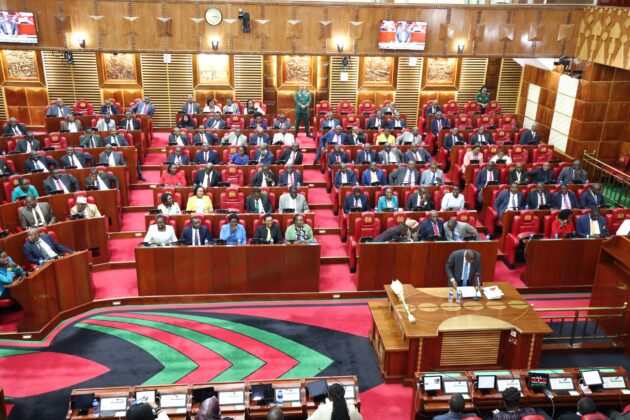
MPs warn against favoritism in SHA staff recruitment » Capital News
NAIROBI, Kenya Feb 17- Members of Parliament have issued a stern warning to the State Department for Medical Services and the Social Health Authority (SHA) Board, stressing the need for a fair and transparent recruitment process at the newly established agency.
This follows the Public Service Commission (PSC) approval of a staff establishment of 800 at the Social Health Authority (SHA), significantly lower than the 1,750 personnel inherited from the now-defunct National Hospital Insurance Fund (NHIF).
Endebess MP Robert Pukose, who chairs the National Assembly Committee on Health, stated that reports of favoritism and victimization in the hiring process will not be tolerated.
Speaking during a committee session on SHA’s implementation team, Pukose emphasized that transparency and merit-based recruitment are essential for the agency’s success, warning that any attempts to manipulate the process would not be tolerated.
He cautioned that the committee would not hesitate to launch an inquiry into the transition from the now-defunct National Health Insurance Fund (NHIF) to SHA if evidence of irregularities in staff recruitment emerged.
“I want to caution the Principal Secretary and the the Social Health Authority (SHA) Board of management that any form of favoritism, intimidation, or victimization in the recruitment process could prompt this committee to initiate an inquiry into the transition process,” he stated.
The MP further pointed out that a flawed hiring process could compromise the agency’s effectiveness, ultimately affecting Kenyans’ quality of healthcare services.
He stressed the need for a professional and independent recruitment process to avoid past mistakes where public institutions became avenues for political patronage.
Pukose underscored the importance of SHA’s independence, saying that the agency must not repeat the mistakes of NHIF, where politically connected individuals were appointed to key positions at the expense of qualified professionals.
“We must manage this transition professionally and ensure it serves its intended purpose. Moving from NHIF to SHA is a critical process, and we need to be extremely careful. If it reaches a point where an inquiry is necessary, it could open up serious issues,” he warned.
The legislator also emphasized that SHA’s leadership including recruitment of the Chief Executive Officers (CEOs) must be carefully selected to ensure the institution runs efficiently and delivers on its mandate to provide affordable and accessible healthcare to Kenyans.
Pukose called on the SHA Board to take its oversight role seriously by ensuring that all recruitment and staffing processes adhere to the law.
He reminded them that the transition clause in the SHA Act must be followed to the letter, guaranteeing fairness and professionalism.
“The law is very clear on the transition process, and we must follow it to the letter. Recruitment should be conducted strictly within legal provisions, with merit as the guiding principle,” he said.
The committee’s concerns come amid growing scrutiny over SHA’s implementation, with stakeholders raising alarm over delays, staffing challenges, and concerns about service delivery under the new scheme.
NHIF staff retention
Lawmakers argue that some of the challenges facing SHA’s implementation stem from the demoralization and undervaluation of NHIF staff, who were seconded to the new agency on a contract basis.
They further argued that the situation is exacerbated by the fact that all SHA staff are on six-month contracts, while the top management serves in an acting capacity.
Led by Mogotio MP, Reuben Kiborek, noted that SHA staff are highly demoralized—not due to a lack of commitment, but because of how they were treated during the transition from NHIF to SHA.
He claimed that they were made to feel as though their services were neither wanted nor required.
“The challenges at the agency are more about the people than the systems. That patriotic spirit—the drive to go above and beyond in serving Kenyans—no longer exists, and this stems from leadership, from the top down,” said Kiborek.
Kiborek urged the SHA board to fast-track the recruitment of a substantive Chief Executive Officer (CEO) and other key personnel to ensure effective leadership and decision-making at the agency.
He stressed that having a permanent officeholder is crucial for making bold, sometimes unpopular, decisions necessary to streamline SHA’s operations and enhance service delivery to Kenyans.
“Some decisions may be unpopular, and some may involve risks. That is why we need a substantive CEO—someone who is not constantly worried about job security but focused on making the tough calls needed to make SHA work.,” he said.
Kilgoris MP Julius Sunkuli, argued that the existing NHIF staff should automatically be considered part of SHA, with only those deemed unnecessary being phased out.
He emphasized that the transition cannot succeed without retaining experiencedpersonnel from the defunct NHIF.
“We need a clear explanation on how you intend to handle the current staff,”Sunkuli demanded.
Kitutu Chache South MP Anthony Kibagendi, echoed similar sentiments, cautioning against a blanket condemnation of NHIF employees.
“We could blacklist problematic sections and conduct fresh interviews where necessary, but all other staff should transition seamlessly. It would be unfair to punish everyone for the mistakes of a few,” he stated.